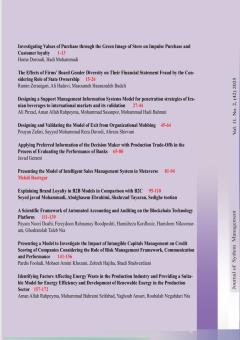Presenting a Model to Investigate the Impact of Intangible Capitals Management on Credit Scoring of Companies Considering the Role of Risk Management Framework, Communication and Performance (Partial Least Squares Structural Equation Modeling (PLS-SEM) Approach)
Subject Areas : FinancePardis Fooladi 1 , Mohsen Amini Khozani 2 * , Zohreh Hajiha 3 , Shadi Shahverdiani 4
1 - PhD student, Department of financial Management, Shahr-e-Qods Branch, Islamic Azad University, Tehran, Iran.
2 - Assistant Professor, Department of financial Management, Shahr-e-Qods Branch, Islamic Azad University, Tehran, Iran.
3 - Department of Accounting, South Tehran Branch, Islamic Azad University, Tehran, Iran
4 - Assistant Professor, Department of financial Management, Shahr-e-Qods Branch, Islamic Azad University, Tehran, Iran.
Keywords: intangible capital, credit scoring, performance, risk management framework and political communication.,
Abstract :
In today’s global business vision, the concept of “Intangible Capitals” has become a central tool to strengthen the value and credibility of firms. Intangible Capitals include non-physical assets like intellectual capital, intellectual property, brand reputation, and employee skills which are crucial for economic growth and firm performance. The purpose of this research is to comprehensively evaluate the impact of intangible capitals on various dimensions of credit profile, including qualitative indicators, quantitative indicators, intelligence indicators and investment indicators, considering the mediating role of the company's performance and the moderating role of the risk management framework and political connections. This paper uses the Partial Least Squares Structural Equation Modeling (PLS-SEM) approach, which allows detailed analysis of the complex relationships between the involved variables. Data has been collected through surveys, enabling a quantitative evaluation of the impacts and interdependencies. The results indicate that Intangible Capitals have a positive and significant impact on credit profile's dimensions.
Abdou, Hussein & Pointon, John. (2011). Credit Scoring, Statistical Techniques and Evaluation Criteria: A Review of the Literature. Int. Syst. in Accounting, Finance and Management. 18. 59-88. 10.1002/isaf.325.
Akwaa-Sekyi, Ellis & Moreno, Jordi. (2017). Internal controls and credit risk relationship among banks in Europe. Intangible Capital. 13. 25. 10.3926/ic.911.
Alsamawi, A., et al. (2020), "Returns to intangible capital in global value chains: New evidence on trends and policy determinants", OECD Trade Policy Papers, No. 240, OECD Publishing, Paris
Amat, Oriol & Manini, Raffaele & Antón Renart, Marcos. (2017). Credit concession through credit scoring: Analysis and application proposal. Intangible Capital. 13. 51. 10.3926/ic.903.
Carroll, Stephen J. and Craig E. Schneier, (2011) "Performance Appraisal and Review Systems" ,Glenview, IL: Scott, Foresman and Company.
Chan, Thim & Choong, Yap & Nee, Chai. (2011). Factors affecting financial distress: The case of Malaysian public listed firms. Corporate Ownership and Control. 8. 345-351. 10.22495/cocv8i4c3art3.
Crouzet, N., Eberly, J., Eisfeldt, A., & Papanikolaou, D. (2022). Intangible capital, non-rivalry, and growth. Available at SSRN.
David, P. A. (2000). Knowledge, capabilities and human capital formation in economic growth (No. 01/13). New Zealand Treasury Working Paper.
Hazan, E. et al. (2021, June 16). Getting Tangible about Intangibles: The Future of Growth and Productivity? McKinsey & Company.
Jarrow, Robert & Turnbull, Stuart. (2000). The Intersection of Market and Credit Risk. Journal of Banking & Finance. 24. 271-299. 10.1016/S0378-4266(99)00060-6.
Robert A. Jarrow, Stuart M. Turnbull (2000). The intersection of market and credit risk, Journal of Banking & Finance, Volume 24, Issues 1–2, Pages 271-299.
Stoner, james. Et al. (2007). Management. Publication of Office of Cultural Research Volume I.
Surendranath R. Jory, Hinh D. Khieu, Thanh N. Ngo, Hieu V. Phan, The influence of economic policy uncertainty on corporate trade credit and firm value, Journal of Corporate Finance, Volume 64, 2020, 101671, ISSN 0929-1199.
Tahat, Y.A., Ahmed, A.H. & Alhadab, M.M. The impact of intangibles on firms’ financial and market performance: UK evidence. Rev Quant Finan Acc 50, 1147–1168 (2018).
Temba, G.I., Kasoga, P.S. & Keregero, C.M. Impact of the quality of credit risk management practices on financial performance of commercial banks in Tanzania. SN Bus Econ 4, 38 (2024).
Yılmaz, İbrahim. (2018). POLITICALLY CONNECTED FIRMS: A REVIEW. International Journal of Management Economics and Business. 14.

